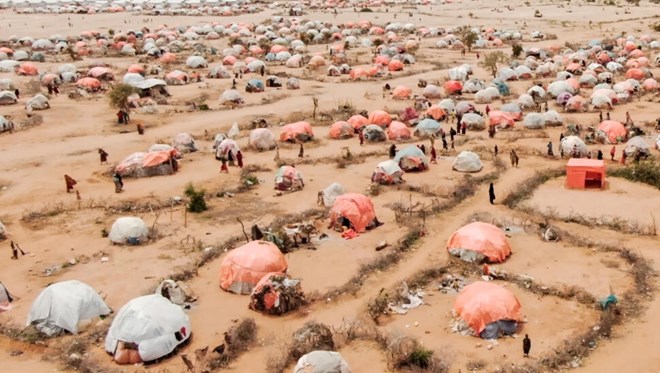
Wednesday May 24, 2023

Somalia and its neighbours in the Horn of Africa including Ethiopia and Kenya have been suffering the worst drought in four decades © Hassan Ali ELMI / AFP/File
Nairobi (AFP) – More than a million Somalis have been displaced within their own country in just over four months through a "toxic" mix of drought, conflict and floods, humanitarian agencies said Wednesday.
Around 433,000 people were forced from their homes between January 1 and May 10 as a grinding Islamist insurgency raged and clashes broke out in the breakaway Somaliland region, the UN refugee agency UNHCR and Norwegian Refugee Council (NRC) said.
in addition, "over 408,000 people were displaced by floods sweeping across their villages and another 312,000 people were displaced by ravaging drought," they said in a joint statement.
Somalia and its neighbours in the Horn of Africa including Ethiopia and Kenya have been suffering the worst drought in four decades after five failed rainy seasons that have left millions of people in need and decimated crops and livestock.
UN chief Antonio Guterres and world governments are meeting in New York on Wednesday at a conference to seek funding of $7 billion to help those in need across the region.
At least 43.3 million people require lifesaving and life-sustaining assistance in the Horn of Africa, the UN humanitarian agency OCHA said last week.
The number of people displaced within Somalia's borders now stands at 3.8 million, with 6.7 million people struggling to find food, according to the UNHCR and NRC.
More than half a million children are severely malnourished, they added.
"These are alarming figures of some of the most vulnerable people forced to abandon the little that they had to head for the unknown," said Mohamed Abdi, the NRC's country director in Somalia.
"We can only fear the worst in the coming months as all the ingredients of this catastrophe are boiling in Somalia."
Most of the families have fled the Hiraan region in central Somalia and Gedo in the south of the country of 17 million people and are arriving in overcrowded urban areas, putting a strain on already stretched resources.
'Human tragedy'The agencies called for urgent and greater investment to combat the crises "otherwise we will never see the end of this unfolding human tragedy," said Magatte Guisse, UNHCR's representative in Somalia.
Currently, aid agencies have received only 22 percent of funding to meet their needs for Somalia this year.
Al-Qaeda linked Al-Shabaab jihadists have been fighting the fragile central government since 2007 and control parts of the countryside from where they have carried out numerous attacks both in Somalia and in neighbouring countries.
Meanwhile flash flooding has hit central Somalia since May after heavy rainfall sent water gushing into homes in Beledweyne town in Hiraan, submerging roads and buildings and killed 22 people.
The Horn of Africa has been scarred by protracted armed conflicts and climate disasters with the World Food Programme (WFP) warning on Wednesday that crises were far from over.
"The last three years of drought has left more than 23 million people across parts of Ethiopia, Kenya and Somalia facing severe hunger," the WFP said in a statement, adding that it would take years for the region to recover.
OCHA said last week that while famine "has been prevented" in the region, the humanitarian emergency was not over.